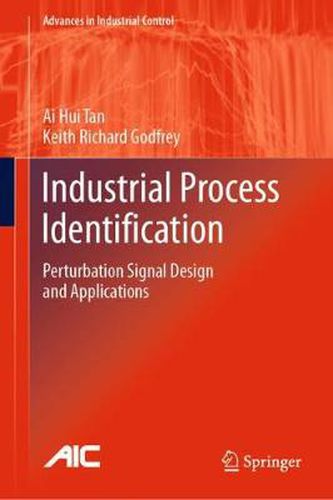Readings Newsletter
Become a Readings Member to make your shopping experience even easier.
Sign in or sign up for free!
You’re not far away from qualifying for FREE standard shipping within Australia
You’ve qualified for FREE standard shipping within Australia
The cart is loading…






This title is printed to order. This book may have been self-published. If so, we cannot guarantee the quality of the content. In the main most books will have gone through the editing process however some may not. We therefore suggest that you be aware of this before ordering this book. If in doubt check either the author or publisher’s details as we are unable to accept any returns unless they are faulty. Please contact us if you have any questions.
Industrial Process Identification brings together the latest advances in perturbation signal design. It describes the approaches to the design process that are relevant to industries. The authors’ discussion of several software packages (Frequency Domain System Identification Toolbox, prs, GALOIS, multilev_new, and Input-Signal-Creator) will allow readers to understand the different designs in industries and begin designing common classes of signals.
The authors include two case studies that provide a balance between the theory and practice of these designs:
the identification of a direction-dependent electronic
nose system; and
the identification of a multivariable cooling system
with time-varying delay.
Major aspects of signal design such as the formulation of suitable specifications in the face of practical constraints, the classes of designs available, the various objectives necessitating separate treatments when dealing with nonlinear systems, and extension to multi-input scenarios, are discussed. Codes, including some that will produce simulated data, are included to help readers replicate the results described.
Industrial Process Identification is a powerful source of information for control engineers working in the process and communications industries seeking guidance on choosing identification software tools for use in practical experiments and case studies. The book will also be of interest to academic researchers and students working in electrical, mechanical and communications engineering and the application of perturbation signal design.
Advances in Industrial Control reports and encourages the transfer of technology in control engineering. The rapid development of control technology has an impact on all areas of the control discipline. The series offers an opportunity for researchers to present an extended exposition of new work in all aspects of industrial control.
$9.00 standard shipping within Australia
FREE standard shipping within Australia for orders over $100.00
Express & International shipping calculated at checkout
This title is printed to order. This book may have been self-published. If so, we cannot guarantee the quality of the content. In the main most books will have gone through the editing process however some may not. We therefore suggest that you be aware of this before ordering this book. If in doubt check either the author or publisher’s details as we are unable to accept any returns unless they are faulty. Please contact us if you have any questions.
Industrial Process Identification brings together the latest advances in perturbation signal design. It describes the approaches to the design process that are relevant to industries. The authors’ discussion of several software packages (Frequency Domain System Identification Toolbox, prs, GALOIS, multilev_new, and Input-Signal-Creator) will allow readers to understand the different designs in industries and begin designing common classes of signals.
The authors include two case studies that provide a balance between the theory and practice of these designs:
the identification of a direction-dependent electronic
nose system; and
the identification of a multivariable cooling system
with time-varying delay.
Major aspects of signal design such as the formulation of suitable specifications in the face of practical constraints, the classes of designs available, the various objectives necessitating separate treatments when dealing with nonlinear systems, and extension to multi-input scenarios, are discussed. Codes, including some that will produce simulated data, are included to help readers replicate the results described.
Industrial Process Identification is a powerful source of information for control engineers working in the process and communications industries seeking guidance on choosing identification software tools for use in practical experiments and case studies. The book will also be of interest to academic researchers and students working in electrical, mechanical and communications engineering and the application of perturbation signal design.
Advances in Industrial Control reports and encourages the transfer of technology in control engineering. The rapid development of control technology has an impact on all areas of the control discipline. The series offers an opportunity for researchers to present an extended exposition of new work in all aspects of industrial control.